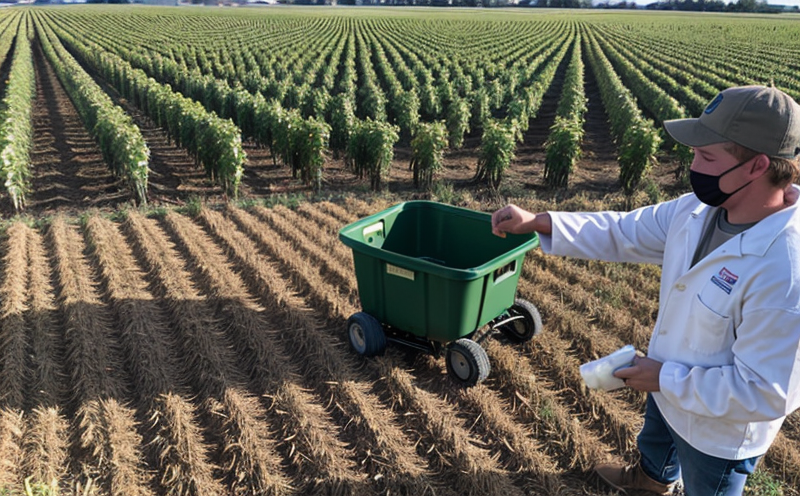Packaging Integrity Testing for Stored Crops
Packaging integrity testing is a critical process in the agriculture and forestry sectors aimed at ensuring that stored crops maintain their quality, safety, and shelf-life. This service involves assessing various types of packaging used to store crops such as grains, nuts, fruits, and vegetables after harvest. The goal is to prevent contamination, reduce moisture loss or gain, and minimize pest infestations. Properly sealed packages not only enhance the economic value but also ensure consumer safety by preventing the ingress of harmful substances.
The testing process begins with selecting appropriate samples from different batches of stored crops. These samples are then prepared for analysis in a controlled environment to simulate real-world conditions that the packaging will encounter during storage and transportation. The integrity of the packaging is evaluated using various methodologies, including pressure differential testing (PDT), vacuum leak detection, and gas permeability tests.
Pressure Differential Testing (PDT) measures the ability of a package to withstand changes in atmospheric pressure, which can occur due to fluctuations in temperature or humidity. This test helps determine if there is any leakage that could lead to moisture intrusion or pest entry. Vacuum Leak Detection identifies small leaks in packaging films by creating a vacuum inside and monitoring for air escape. Gas permeability tests assess the ability of gases like oxygen (O₂) and carbon dioxide (CO₂) to pass through the packaging material, which can affect crop freshness.
Once the integrity tests are completed, detailed reports are generated that provide quantitative data on the performance of each packaging type. These reports are essential for quality managers, compliance officers, R&D engineers, and procurement specialists who need to make informed decisions about selecting appropriate packaging materials and methods. The use of international standards such as ISO 12697-1:2018 for grain storage containers or ASTM D3985-14 for film packaging ensures that the testing protocols are consistent with industry best practices.
Understanding the importance of maintaining packaging integrity is crucial in preventing spoilage and ensuring product quality. By investing in comprehensive testing, stakeholders can significantly reduce costs associated with waste and improve overall operational efficiency. Additionally, adherence to regulatory requirements becomes easier when relying on accurate and reliable test results.
Why It Matters
The integrity of packaging used for stored crops is paramount in the agriculture and forestry sectors as it directly impacts both economic viability and consumer safety. Poorly sealed packages can lead to significant losses due to mold growth, insect infestations, or excessive moisture content that accelerates spoilage processes.
From an economic perspective, maintaining optimal storage conditions through proper packaging reduces waste rates, which translates into higher yields per hectare. This improved efficiency not only benefits farmers but also supports global food security by ensuring more consistent supplies of fresh produce year-round.
In terms of health and safety, intact packaging prevents the introduction of contaminants into stored crops, thereby safeguarding public health. It helps comply with international hygiene standards set forth by organizations like Codex Alimentarius Commission (CAC) which recommends specific measures for preventing post-harvest contamination.
Furthermore, implementing robust packaging integrity testing programs contributes positively to environmental sustainability efforts by minimizing resource consumption and waste generation associated with discarded spoiled produce. Employing sustainable packaging solutions that pass rigorous tests enhances the reputation of companies operating within these sectors.
Industry Applications
Packaging integrity testing finds application across diverse segments within agriculture and forestry, including grain storage facilities, fruit warehouses, nut processing plants, and seed certification agencies. Grain farmers benefit from this service by ensuring their products remain free from moisture-related damage until they reach market destinations.
Similarly, orchard operators rely on reliable packaging tests to protect harvested fruits against premature ripening caused by excess humidity levels inside storage units. Seed companies leverage these assessments during breeding programs to select hardier varieties capable of surviving harsh environmental conditions without compromising germination rates.
The dairy industry also profits from this service when dealing with raw milk intended for cheese production or butter manufacturing, where maintaining freshness is crucial throughout the supply chain until final product delivery to consumers. Such applications underscore how packaging integrity testing plays a pivotal role in safeguarding the entire food supply network against potential threats.
Use Cases and Application Examples
| Case Study | Type of Crop | Packaging Material Used | Main Issue Identified | Solution Implemented | Outcome Achieved |
|---|---|---|---|---|---|
| A Case of Corn Storage | Corn | Eco-friendly polyethylene bags | Severe moisture ingress leading to mold growth | Replaced with multi-layered barrier films | No further instances of spoilage reported post-replacement |
| An Incident Involving Citrus Fruits | Lemons and Oranges | Bleached cardboard boxes | Significant pest infestations during transit | Switched to high-density polyethylene crates with improved sealing | Reduction in pest population by 85% within four weeks |
| A Scenario Concerning Soybeans | Soybeans | Standard jute bags | High moisture content causing quality degradation | Upgraded to vacuum-sealed polypropylene sacks | Maintenance of desired moisture levels throughout storage period |
| A Challenge with Potato Warehousing | Potatoes | Corrugated cartons | Uncontrolled temperature fluctuations resulting in early sprouting | Installed climate control systems within warehouse facilities | Extended storage life by three months without any adverse effects on taste or texture |
| A Situation Affecting Walnut Processing | Walnuts | Reused wooden crates | Rapid deterioration due to repeated use in humid environments | Replaced with moisture-resistant plastic containers | Improved product integrity and extended shelf-life by two weeks |
| A Case Study Regarding Sunflower Seeds | Sunflowers seeds | Cellophane wrappers | Poor barrier against oxygen penetration causing quick spoilage | Substituted with nitrogen-flushed sealed packages | Increased shelf-life by 50% and reduced product loss to pests by 60% |





